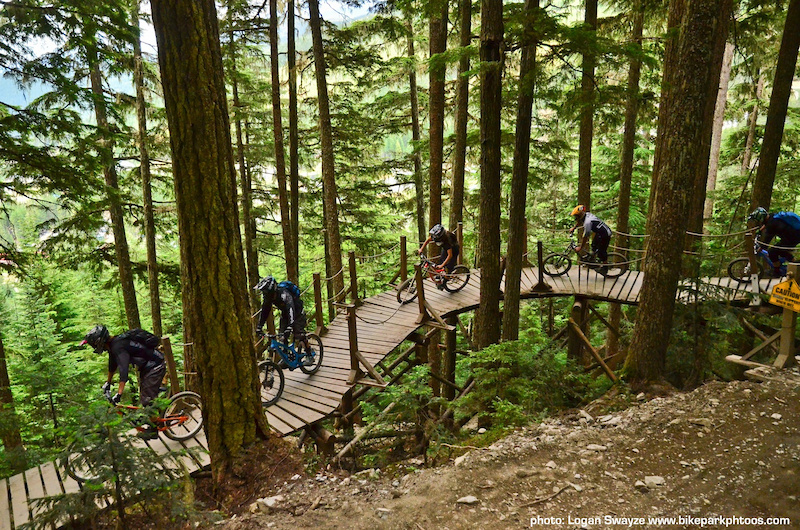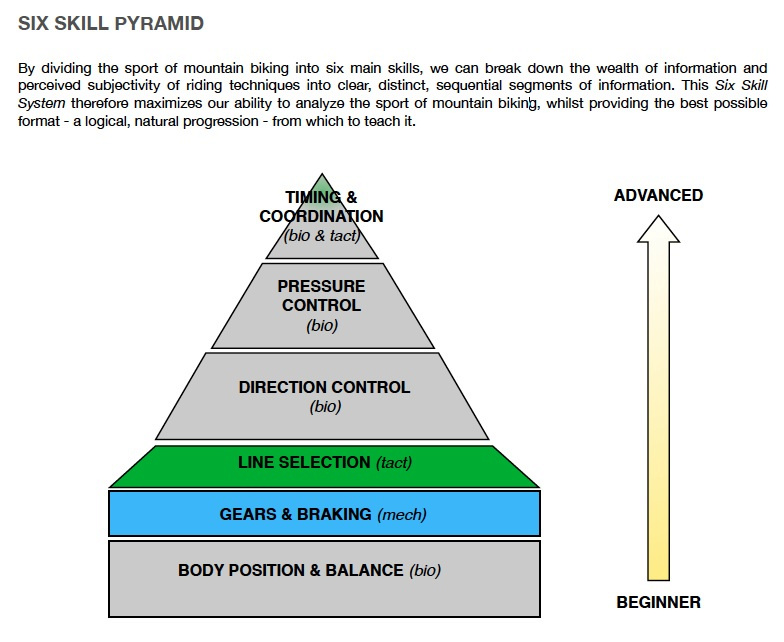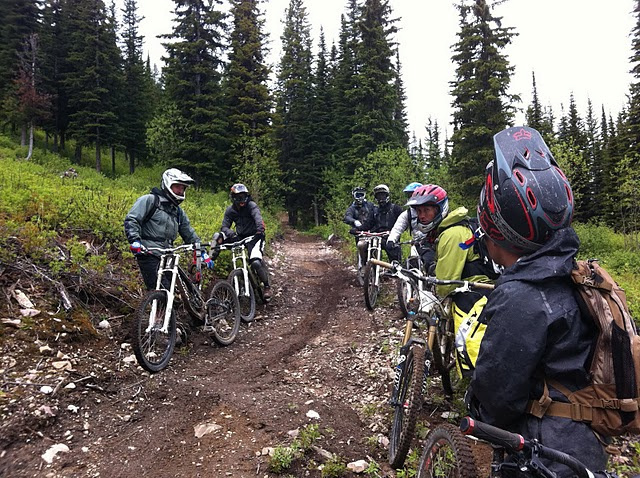By Ryan Kuhn
As coach and co-manager of a budding World Cup downhill race program, I believe I have valuable knowledge to impart to young racers. But I also recognize the need to develop a more systematic approach to coaching ? one that would allow the racers and myself to be able to share the same terminology, skill breakdown and self-evaluation to take them to the next level.
Last fall, I learned of Paul Howard and ZEPtechniques. I was talking to my buddy Andy Bostock, who happens to be former British DH and World Masters Champion, and he strongly endorsed the coaching certification he had recently done with Paul at ZEP.
?After retiring from racing I wanted to give something back to the sport and teaching was the obvious thing to do,? says Andy. ?The ZEP certification (Professional Mountain Bike Instructor, or PMBI) is fast becoming the industry standard in Canada for instructors at resort-based bike parks. I feel it is important to have a set standard and Paul at ZEP is striving for this.?
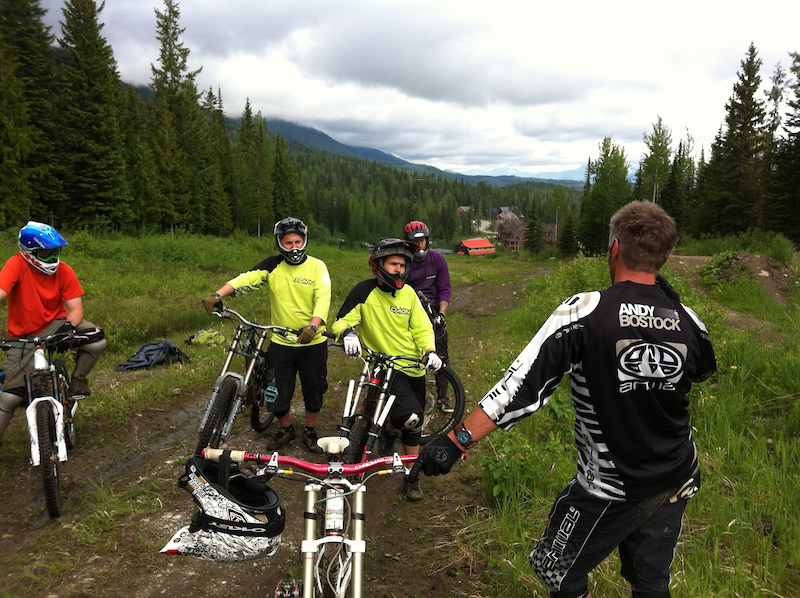 Andy Bostok practices instruction during the Level 2 certification course at Kicking Horse Mountain Resort.
Andy Bostok practices instruction during the Level 2 certification course at Kicking Horse Mountain Resort.
I was intrigued and not long after Paul and I met over a cup of coffee at Crankworx and discussed all aspects of high-end teaching and coaching, and the lack of a systematic approach to instructing mountain bike coaches how to coach. We agreed the next best step was for me to get my Level 2 certification to instruct intermediate to advanced riders, and in turn we?d work towards developing a Level 3 coach?s certification.
?After running a mountain bike school in a large outdoor camp in the States for five years, I wanted to get certified so I had the ?piece of paper,?? says Paul. ?Long story short, all the courses I took ended up being a bit of a joke. Essentially each ?instructor? course I did failed to train people how to teach the skills and techniques in biking, and were more of a ?learn how to guide? than anything else. There’s still a number of instructor courses like this out there today.?
ZEPtechniques was founded in 2005. Paul?s experience in mountain biking, teaching, pedagogy (instructor training), bio-mechanics, physics and professional demeanor make him a skilled mountain bike instructor. Paul started teaching mountain biking in 1998 when he established a cycling club for students while teaching high school in Australia. The following year, he took a job as Director of a Mountain Bike School in North Carolina, USA, and next five summers were spent developing coaching programs for riders and instructor training for instructors.
In 2001, Paul earned his B.Sc. Genetics degree and moved to Canada to begin his winter career as a snowboard instructor. As a member of the Canadian Association of Snowboard Instructors National Evaluator Training Team, Paul is a CASI Level 4 Instructor, CASI Examiner, Park Instructor, Race Instructor and Head Snowboard Trainer at Whistler-Blackcomb Snowboard School – all of which has contributed greatly to his mountain bike instruction program.
Since PMBI?s inception, Paul has certified over 500 people in mountain bike instruction and the uptake on his courses is growing rapidly. All the while Paul strives to improve his courses, taking feedback from participants seriously and always looking for ways to improve.
?Three factors arose that prompted me to start running my own instructor training courses,? he says. ?I had already developed a week-long staff training program in the states and knew that what I had developed was far stronger, more comprehensive and relevant as a mountain bike instructor training course.”
?As a CASI Snowboard Instructor and Examiner in the winter months, I already knew just how professional and comprehensive an instructor training course should be…and that was key. Seeing it done properly and to such a high standard gave me a benchmark from which to compare mountain bike instructor courses in the summer.”
?Finally, after having so many hours teaching the sport to all sorts of different kids and adults I firmly began to believe in one simple idea: The more properly certified instructors the industry has, the easier it will be to bring people into the sport and therefore grow the sport.?
The ZEP instructor?s course is based on six basic, but intrinsically connected skills:
? Body Positioning and Balance
? Gears and Braking
? Line Selection
? Direction Control
? Pressure Control
? Timing and Coordination
Biking is a blend of these six skills, which are essentially bio-mechanical (physics of body movements), mechanical (bike operation) and tactical (strategies for the rider) components of riding.
The ?Six Skills? allow the instructor and rider to isolate the components of what they?re actually doing. While beginner riders will focus on the first two skills (Level 1), intermediate to advanced riders (Level 2) focus on all aspects of these fundamental skills, advancing their abilities from bike operation and body position to pressure control, direction control and timing and coordination as it relates to all the really fun aspects of mountain biking ? cornering, drops and jumping.
While it?s impossible to convey the tactics involved in teaching the Six Skills here, it?s safe to say that the comprehensive and technical detail of the PMBI program is extensive (a reason why many in the PMBI courses don?t get an automatic pass). Additionally, Paul puts emphasis on the principles of teaching, instructor attributes, learning theory, learning styles and the principles of learning ? all essential elements of being a good teacher.
Another participant in my Level 2 course, held at Kicking Horse Mountain Resort (KHMR), was Kyle de Hrussoczy Wirth, the resort?s Mountain Sports Manager responsible for summer mountain bike rental and retail shop, as well as their mountain bike instructor program.
?I took the PMBI course for several reasons: personal interest due to my passion for biking, professional development – to effectively manage the department and staff in the KHMR mountain bike school – and finally to improve my own riding,? says Kyle. ?I learned firsthand how beneficial these courses are to develop not only one?s instruction abilities, but riding as well.?
As I went through the Level 2 course I felt confident in the instructor training we were receiving, but it was experiences such as Kyle?s that really struck home. Kyle is an expert rider, but with a day?s jump instruction I saw his confidence and style improve markedly, which was the icing on the cake.”
?We chose the PMBI because it is the best program that we?ve come across,? adds Kyle. ?Our insurers wanted to see a comprehensive program and they were familiar and happy with PMBI. We see a benefit to all experience and training our staff have – the more the better.?
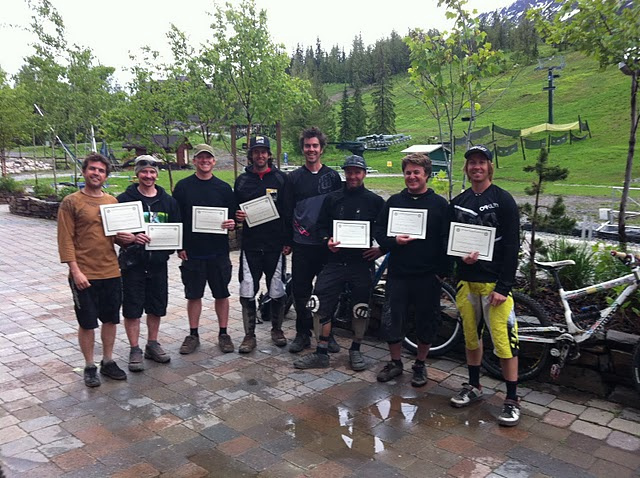 Successful instructors: students of the Level 2 instructors course proudly display their certifications from PMBI.
Successful instructors: students of the Level 2 instructors course proudly display their certifications from PMBI.
It?s not only bike park instructors that are benefitting from the PMBI course. Recently, Whistler-based World Cup veteran Chris Kovarik and his wife Claire Buchar (who just finished 3rd at the DH World Championships!) became certified as Level 2 coaches.
?We wanted to make sure we were offering quality teaching/coaching to everyone we work with,? says Chris. ?We genuinely want to get people stoked on riding, to feel how rad it is to rail that corner, flow through that section, get that air. Having a certification also helps credibility, but we just want to ensure that we are providing a quality product.?
Claire, who also won this year?s Canadian National Championship, agrees.
?I think having more certified coaches could help the biking industry,? says Claire. ?Getting people stoked on mountain biking and teaching them effectively and safely will only get them more hooked on the sport.?
And that?s the fundamental goal behind ZEPtechniques ? to learn safely and effectively.
?I have always believed that the key to growing the sport is making it safer and easier for people to learn, whether that’s beginners learning the basics or intermediates wanting to progress to the next level,? adds Paul. ?The easier it is to learn without getting hurt, the more people will do it because it’s the most fun thing in the world.?
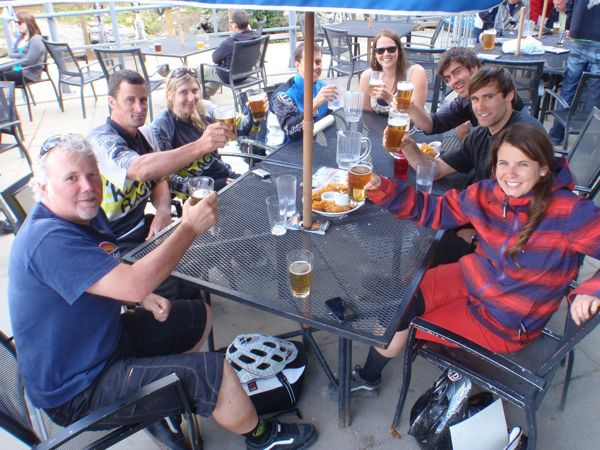 A star-studded class, including Chris Kovarik, Claire Buchar and Katie Holden, celebrate their successful Level 2 instructors certification at Whistler.
A star-studded class, including Chris Kovarik, Claire Buchar and Katie Holden, celebrate their successful Level 2 instructors certification at Whistler.
Stay tuned for Part 2 when we examine the objective of the Level 3 coaches? certification with ZEPtechniques.
Ryan Kuhn was recently certified as a Level 2 Mountain Bike Coach with ZEPtechniques. He is also the co-manager and coach for the PerformX Downhill Team. He lives in Rossland, BC.

